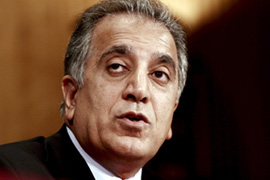UN extends forces mandate in Iraq
Iraqi foreign minister says foreign troops “vitally necessary” for regional stability.

He said: “While Iraqis will always be grateful for their liberation from an absolute despot, no Iraqi government official – indeed, no Iraqi citizen – wants the presence of foreign troops on Iraqi soil one day longer than is vitally necessary.
“But today, and for the foreseeable months at least, the presence of [foreign] troops is vitally necessary not only for Iraq but also to safeguard regional security and stability.”
Shrine blast condemned
In its statement, the UN said: “As requested by the government of Iraq … the members of the council agreed upon the continuation of the mandate.”
While Russia supported the extension of the multinational force’s mandate, Vitaly Churkin, Russia‘s ambassador to the UN, said: “We also need to signify the deadlines in which the MNF – which we must say is a serious irritant for many Iraqis – will leave the country.
“It’s not about an immediate publicising of a date, but for Iraqis … it is important to see the prospects of a full completion of the foreign military presence in their country.”
Zalmay Khalilzad, the US ambassador to the UN, while briefing the council on behalf of the US-led force, said Iraq’s success in promoting stability and consolidating its “young democracy” will depend not only on progress in the security sector, where the multinational force plays an important supporting role, but on advances in the economic field “and most importantly movement in the political arena”.
Progress ‘slow’
 |
| Khalilzad, the US ambassador to the UN, said reconciliation is essential in Iraq [EPA] |
Khalilzad said the performance of the Iraqi security forces “is critical to the success” of a major US-Iraqi security push to pacify Baghdad. Since the joint operation began in February, Khalilzad said attacks against civilians and sectarian murders in the city have decreased while attacks against US-led forces and high-profile terrorist attacks are still frequent.
Taking a bleaker view of the Baghdad operation, Ashraf Qazi, the senior UN envoy in Iraq, said that despite the “courageous efforts of the Iraqi and multinational security forces to stem the violence, progress has been slower and more uncertain than had been hoped for.
“Iraq is today faced with an exceptionally complex series of overlapping sectarian, political and ethnic conflicts that are beyond the capacity of any one actor or policy to resolve.“
Both Qazi and Khalilzad said progress on national reconciliation is essential.
Qazi said: “However, the impact of bitter memories, fresh grievances, perceived discrimination, increasingly entrenched identity politics, mutual mistrust and intolerance, and, above all, the horrific and unending killings, has brought about an environment in which constructive and productive discussions leading to lasting reconciliation appear to be very difficult.”
But he said the United Nations, supported by the Security Council and the Iraqi government, “has the potential to effectively assist and develop national dialogue and reconciliation processes, regional cooperation on Iraq, and international support”.